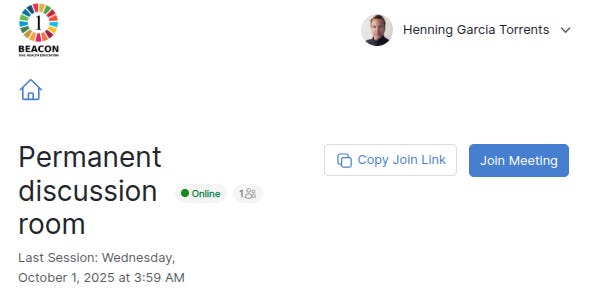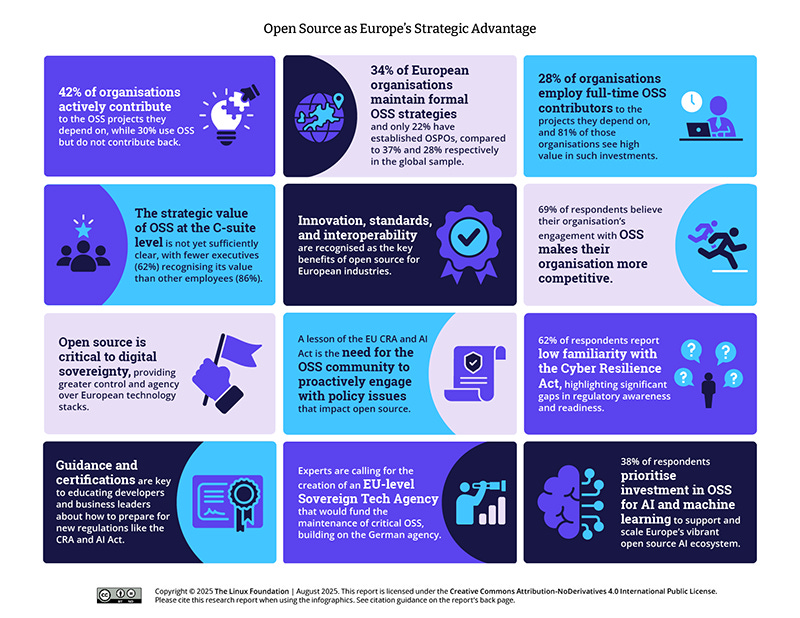Launching our independent digital backbone for EU BEACON One Health Education action
BigBlueButton open source videoconferencing now installed on our action server, strengthening sovereignty, collaboration, and innovation in teaching and research
Reading time: 10-15 minutes.
Executive summary: I have successfully installed BigBlueButton on our new action server at https://tele.health.int.eu.org/show/tell/. This is a major step forward, giving us an open-source, education-focused videoconferencing system already trusted by ministries and schools across Europe. Hosting it ourselves ensures sovereignty, cost savings, and features tailored to teaching rather than business meetings. Alongside BBB we are deploying Matrix/Element for secure messaging, LeanTime for project management, Consul Democracy for participatory governance, LibreTranslate for multilingual collaboration, and survey tools for rapid engagement. Pooling these open-source resources provides our network with a robust backbone for research, governance, and education while saving money and strengthening sustainability. The videoconferencing was the most urgent and is now operational; the remaining services will be ready in time for the kick-off.
As scientific triad officer of the EU BEACON One Health Education COST action, responsible of communications, dissemination, and exploitation, I am pleased to announce that I have successfully installed BigBlueButton videoconferencing on our action server. Please, test it extensively, let me know if there are any issues to take care of: https://tele.health.int.eu.org/show/tell/
BigBlueButton (BBB) is the leading open source videoconferencing platform, designed specifically for online learning and collaboration. It was created in 2007 at Carleton University in Canada and has since grown into a global project maintained by a wide community of universities, schools and non profit organizations. Unlike generic video conferencing tools it is built for education with features such as breakout rooms, polls, shared notes, whiteboards and seamless integration with Moodle, Canvas and other learning platforms. It is used by schools and universities across Europe, North America, Asia and Africa, by governments and NGOs for training and health education, and has been adopted in large scale by institutions such as UNESCO, French universities, German schools and Italian hospitals. For our action it represents the best choice because it is open source and sovereign, focused on education rather than business meetings, scalable and affordable, and proven in thousands of classrooms and training programs. It embodies the values of openness, collaboration and trust that we want to sustain in our one health education network.
This is a significant step forward because it gives us our own independent system rather than depending on costly commercial providers. By running our own BBB we save resources, avoid licensing fees, and ensure that the platform serves our needs rather than the other way around. It also allows us to deliver a solution that is richer and more adapted to education than most closed tools on the market, combining security, sovereignty and the interactive features our work requires. I warmly invite everyone to test the platform and experience the difference, your feedback will help us shape it into a powerful space for collaboration and learning for our network.
BBB provides low latency conferencing, breakout groups, shared whiteboard, polls, and recordings, designed for learning at scale rather than generic meetings. Hosting it ourselves reduces cost, improves data stewardship, and permits custom extensions such as tailored layouts, analytics, and multilingual captions aligned with our pedagogy. A stable room permalink simplifies onboarding across schools and partner institutions. BBB is widely deployed across Europe in ministries, regional education systems, and universities, particularly in contexts where privacy, pedagogical integration, and public accountability are essential.
The French Ministry of National Education has adopted BBB as its official infrastructure for webinars and online teaching, and has directly supported its further development. In Germany, the state of Baden-Württemberg rolled out BBB during the pandemic for hundreds of thousands of teachers and students, making it one of the largest educational deployments in Europe. The state of Rhineland-Palatinate operates a central BBB service for all schools, colleges, and universities, ensuring compliance with data protection rules and providing dedicated support. The municipal media center in Wiesbaden hosts BBB for local schools, integrating it with authentication systems under strict privacy standards. In South Tyrol, schools adopted BBB hosted on European servers to guarantee data sovereignty while maintaining continuity of learning.
These cases show that ministries and regional education authorities trust BBB at large scale. They demonstrate that the platform functions reliably under strict European data protection requirements, can integrate smoothly with school IT systems, and supports both everyday teaching and emergency remote education.
For our action, BBB is the most fitting choice because it is open source and sovereign, giving us control over data and code while avoiding dependence on external vendors. It was designed specifically for education rather than business meetings, offering breakout rooms, polls, whiteboards, shared notes, and recording tools optimized for learning. It is scalable and affordable, suitable for use in many classrooms simultaneously without licensing restrictions. Most importantly, it is proven across Europe by ministries and schools under conditions comparable to ours, making it both a safe and strategic choice.
Adopting BBB reflects our commitment to openness, collaboration, and trust. By building on an open source system already recognized in European education, we ensure that our one health education network stands on a solid, sustainable foundation while contributing improvements back to the global community.
Other open source, top quality, services will following in the coming hours or days.
The action team chat messaging and federation will be soon powered through Matrix on our infrastructure. Matrix is an open protocol for secure real time communication across organizations. It enables rooms, threads, and end to end encryption with bridges to other networks when needed. Running our own homeserver ensures sovereign control of identities and retention policies while enabling federation with universities and ministries that already use Matrix. Element is the primary web and desktop client for Matrix. It offers a clean interface, robust search, verified encryption, voice and video calls, and spaces for hierarchical organization of working groups. For users accustomed to classic chat with a visible member list it can be configured to present an always visible roster, enabling frictionless adoption during workshops and governance sessions. This bit of our infrastructure will be ready between tomorrow and next Friday.
LeanTime will manage projects, sprints, roadmaps, Gantt plans, timesheets, and retrospectives. Its lightweight design suits multidisciplinary teams spread across countries. One workspace per work package with shared calendars and task boards gives clear accountability and transparent progress for dissemination and exploitation milestones. Self hosting avoids vendor lock in and permits tailored roles for students, teachers, and external collaborators.
SurveyMonkey will provide rapid survey deployment while the consortium ramps up, particularly for time critical stakeholder canvassing. It supports complex skip logic and fast distribution at scale. For research ethics and open science alignment we will in parallel prepare a self hosted alternative based on LimeSurvey to enable full data portability, custom consent workflows, and multilingual forms for schools.
Consul Democracy will underpin participatory governance. The platform supports proposals, debates, participatory budgeting, and formal voting with verifiable processes. It gives working groups a clear path from discussion to decision, records deliberation trails, and aligns with our commitment to transparent and reproducible governance. Hosting it within our domain integrates identity and audit with the rest of the stack.
Open source matters for three reasons central to this action. First, technical sovereignty ensures that data, algorithms, and workflows remain under our control, meeting European values and school safeguarding norms. Second, adaptability allows us to extend features needed for one health education, from accessibility to domain specific analytics, then contribute improvements upstream for community benefit. Third, sustainability arises from a shared development ecosystem where maintenance, security patches, and localization are community efforts, not single vendor promises.
The integration plan is straightforward and pragmatic. This stack gives the action a coherent digital backbone for teaching, collaboration, decision making, and outreach. It minimizes recurring cost, maximizes control, and creates a conduit for research to inform technology while technology strengthens research and education.
At trans.health.int.eu.org I have deployed LibreTranslate, an open-source neural machine translation system, as part of a broader strategy to pool shared resources for our entire network. LibreTranslate illustrates the principle behind our digital infrastructure: rather than relying on expensive third-party platforms, we host and maintain powerful tools ourselves, ensuring sovereignty over data, adaptability to our needs, and open access for all members of the action. By doing so, we save substantial costs while making advanced services freely available to schools, universities, ministries, and civil society partners.
By hosting these services together within our network’s system, we are creating an integrated toolkit that supports all dimensions of our work: collaborative research, governance, education, dissemination, and outreach. This infrastructure does more than save money. It provides our action with the best possible power tools for participatory action research and for missions where inclusivity, transparency, and data protection are non-negotiable. It allows us to adapt features to one health priorities, such as customizing translation models for medical and environmental terminology, shaping decision-making platforms to reflect our governance ethos, or fine-tuning videoconferencing to classroom and fieldwork realities.
By pooling these resources, we embody a sustainable model of collective ownership. Every member of the network benefits from state-of-the-art services without bearing individual licensing costs, while the improvements we make can be shared back with the global open-source communities that maintain them. This approach aligns with our values of openness, collaboration, and solidarity, ensuring that our one health education network has both the independence and the technological strength to thrive.
Hardware-wise, we have secured what can only be described as an absolute bargain: access to a very high-performance virtual private server that gives us resources normally reserved for large-scale enterprises. The machine provides almost 4 terabytes of storage (3.906 TB), 32 virtual CPU cores, and 128 gigabytes of RAM memory. This combination of storage, processing power, and memory capacity places us in a position to run simultaneously the full stack of services needed for our action without fear of bottlenecks or scalability issues. For BigBlueButton, such resources mean we can sustain multiple parallel conferences with video, audio, and recording without degradation of quality, even at times of heavy use by hundreds of students. For Matrix and Element, the extra memory and CPUs guarantee responsive chat and federation even as our user base grows into the thousands. LeanTime, Consul Democracy, and survey platforms can each be hosted in production-grade instances, isolated and secured, while still benefiting from a common infrastructure. The large disk capacity is critical for long-term storage of recordings, shared files, and backups, ensuring that we do not depend on external providers for basic capacity.
The cost–benefit ratio is extraordinary. Comparable servers are typically priced well beyond the budget of an academic project, and it is costing us less than fifty euros per month. By securing this one at low cost we ensure that all consortium members and school partners benefit from enterprise-class performance for the price of a modest service. This not only maximizes sustainability and independence but also allows us to experiment, improve, and share innovations with the open source community, fully confident that our infrastructure can handle the workload.
I am doing my best to complete the installation of the entire digital infrastructure in time for the action’s kick-off. The videoconferencing system was the most urgent priority, as it is essential for our immediate coordination and teaching needs, and it is now fully operational. The remaining services are in the process of being deployed and configured, and will be ready shortly, ensuring that our network starts its work with a complete, robust, and open digital backbone. Please, let me know what you would like to see installed, shared among us all to work better.




